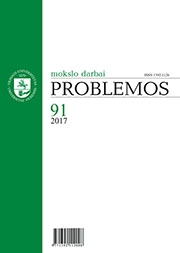ARISTOTELIS VS. PLATONAS: ΜΈΘΕΞΙΣ SĄVOKOS KRITIKA
ARISTOTLE VS. PLATO: CRITICISM OF THE NOTION OF μέθεξις
Author(s): Skirmantas JankauskasSubject(s): Metaphysics, Epistemology, Ancient Philosphy
Published by: Vilniaus Universiteto Leidykla
Keywords: participation; scientific knowledge; existences; essential entity; constructive activity;
Summary/Abstract: The paper deals with the assumptions and meaning of Aristotle’s criticism of Plato’s philosophy. The study is focused on the concept of participation (μέθεξις) which was very important to Plato and which was totally neglected by Aristotle. Assuming that radically different approaches of two philosophers should have objective grounds, an attempt is made to reconstruct the ontognoseological observations of the philosophers. The analysis of Plato’s concept of anamnesis reveals that the concept of participation is exploited to reconstruct the ontological assumptions of anamnesis. Further it is demonstrated that the concept of participation rests upon the analytically incorrect assumption about logical connection between perceptually experienced thing and intellectually perceived idea. Analytical inconsistencies of Plato’s thinking then are linked to the prevalence of the existential (ethical) intentions of his philosophizing. In the reconstruction of Aristotle’s philosophizing attention is drawn to the fact that the starting point of this thinker is the conception of true (scientific) knowledge (ἐπιστήμη), which predetermines his ontological conclusions. It is shown that Aristotle, as a more consistent analytical thinker, delimits perceptually experienced thing and its intellectually accessible reason – οὐσία – and in this way makes the Platonic concept of participation lose its meaning. At the end of the article an attempt is made to demonstrate that for Plato much higher significance of the concept of participation is determined by his existential intentions of philosophizing. The participation is interpreted here as a way in which a human being communicates with his existential media. Finally, Aristotelian concept of τέχνῃ is discussed and the arguments are put forward that it can be viewed as a clarification of Platonic concept of participation.
Journal: Problemos
- Issue Year: 2017
- Issue No: 91
- Page Range: 99-114
- Page Count: 16
- Language: Lithuanian

